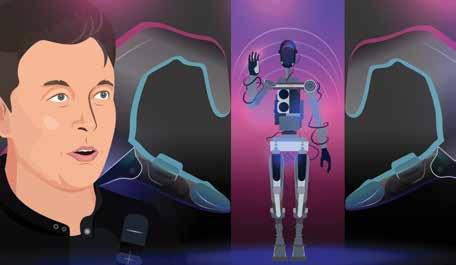
3 minute read
Curtin researchers pioneer a way to see inside the brain of AI and robotic systems
Advertisement
Elon Musk hopes his humanoid robot 'Optimus' will "help millions of people," freeing humans from boring, dangerous and repetitive work.
Using Robots in the future for work has just come up another step as Curtin software and engineering researchers announce they have developed a way to assess and inform on the ethical, social and moral logic of AI and robotic systems, when they are making decisions which could boost their reliability and integrity.
The breakthrough could also make the use of artificial intelligence more acceptable and applicable across multiple areas including the medical sector, legal sector and mining industry.
Dr Masood Mehmood Khan from Curtin’s School of Civil and Mechanical Engineering has not only invented the framework, called the Accountable eXplainable AI (AXAI), but also proposed a software design process to integrate it into AI systems.
Dr Khan said “Failing to provide measures of comprehensibility and accountability, means most AI and Machine Learning (ML) systems are unable to gain wider public support and approval. At present, these systems cannot explain their decisions and their level of intelligence, expertise and capabilities are also limited because of the built-in biases in the training data and algorithms. For example, if a rescue robot reaches an accident scene and decides to help one person leaving others unattended, questions will be asked on the ethical, social and moral logic of the robot. Failing to explain its decision, the robot will never be trusted by the society. Our system solves that problem.”
Viva Energy to acquire Coles Express
Viva Energy Group Limited has announced they will acquire the Coles Express convenience business from Coles Group, creating the largest fuel and convenience network in Australia under a single retail operator.
This acquisition accelerates the company’s strategy to transition to a fully integrated fuel and convenience retailer and maintain its leading position in the attractive and fast growing convenience segment.
“This is an exciting step for Viva Energy that will enable us to further extend our network, invest in new and innovative convenience offers across our stores, and enhance our loyalty and digital programs to simplify the way our customers transact with us” said Scott Wyatt, Viva Energy’s Chief Executive Officer.
“The pandemic has changed the way people work and how they shop. They are shopping more locally, and want more convenience and a wider range of quality products and services. In the future, customers will also be looking for convenient electric vehicle recharging options while they are on the road, and in time we can also expect to see hydrogen refuelling facilities at major highway service centres.
The acquisition is subject to regulatory approvals and is expected to complete in the first half of 2023.
Hanover - zero emission vehicle technology
The sparks flew at the IAA Transportation event in Hanover with the world’s leading truck manufacturers unveiling the latest in net zero emission vehicle technology.
Volvo Trucks unveiled a completely new, fully electric rear axle for extended range and say this design frees up space for more batteries and provides even longer range for its battery electric trucks.
Daimler presented its battery-electric long-distance truck; eActros LongHaul which they say will have a range of around 500 km without intermediate charging. They say in the future, it will be possible to charge the batteries from 20 to 80 percent in significantly less than 30 minutes.
DAF Trucks (PACCAR) revealed a
completely new series of fully electric powertrains for the New Generation DAF XD and XF trucks. PACCAR says the new trucks feature completely new modular drivelines for ‘zero emission’ ranges from 200 to over 500 kilometres on a single charge. They say fully electric ranges can even exceed 500 kilometres.
In addition to these new electric truck announcements, leading truck manufacturers remain committed to the development of hydrogen truck models for longer distance transport.










